Recent News
■ 05/15/2023: Dependent misconfigurations in 5G/4.5G RRC at CoNext'23
■ 12/28/2022: CA++ at MobiCom’23
■ 12/10/2022: MI-LAB Used for a 5G measurement study in the US
■ 11/28/2021: Map has a new look!
■ 08/05/2021: Reconfiguration at ICNP'21
Archives
■ 11/21/2020: MI-LAB 5.0 Released!
■ 09/23/2020: iCellSpeed at MobiCom’20 Increases 4.5G Data Speed Without Network Changes!
■ 05/01/2020: MI-LAB for Assessing COVID-19 Impacts on US Carrier Networks
■ 03/03/2020: One More Success Story Over MI-LAB
■ 08/26/2019: MI-LAB Testbed Management is available
■ 06/06/2019: MI-LAB has a NEW Look!
■ 05/15/2019: NCTU team joins MI-LAB!
■ 01/08/2019: MI-LAB first used for a new course
■ 10/15/2018: Statistical Result are available
■ 10/01/2018: Tutorial page is online
■ 08/14/2018: MI-LAB Kicks Off!
■ 08/01/2018:MI-LAB is migrated to milab.cs.purdue.edu for public release.
■ 09/15/2017:MI-LAB runs MMDIAG to collect handoff configurations at global-scale.
■ 08/20/2017:MI-LAB is internally released.

Dependent misconfigurations in 5G/4.5G RRC at CoNext'23: Another Success Story!
May 15, 2023
PhD students from Purdue and UCLA advised by Prof Peng and Prof Lu have conducted another success story over MI-LAB.
The team has used MI-LAB to conduct a 5G measurement study in the US and analyzed the collected traces to analyze inter-dependence among RRC configurations. Different from their previous studies in 3G/4G networks, 5G/4.5G allows more than one cells to serve a mobile device, resulting in more configuration dynamics and complexity that vary with all the serving cells. The team has analyzed inter-dependency among configurations, categorized dependent misconfigurations, uncovered their root causes, and quantified negative performance impacts. The team has unveiled two types of dependent misconfigurations among states (inter-state) and within a state (intra-state); They stem from structural dependency and cross-parameter dependency. Such misconfigurations incur service disruption and performance degradation. These findings have been largely validated with three US operators and one Chinese operator; This study has uncovered 644 instances of problematic dependencies.
The paper will appear at ACM CoNext'23, Dec 5 - 8, Paris, France.
Datasets and codes are released at Github.
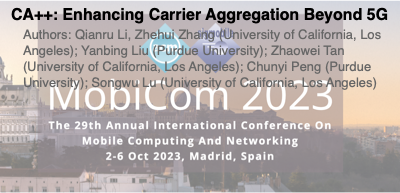
CA++ at MobiCom’23: Another Success Story!
December 28, 2022
PhD students from Purdue and UCLA advised by Prof Peng and Prof Lu have conducted another success story over MI-LAB.
In this project, the team has proposed CA++, a group-based design scheme to enhance legacy carrier aggregation (CA). The core enabler is two new algorithms that enable concurrent channel inference by measuring one or few cells but inferring all, while minimizing measurement cost via set cover approximations. One characterizes channels in the delay-Doppler domain and admits and calibrates fractional Doppler shifts, thus enabling accurate and concurrent channel inference for all nearby cells. The second algorithm minimizes the cell measurement cost via a new set cover abstraction and its greedy approximation.
They have validated the effectiveness of CA++ through real experiments over SDR-based testbed and what-if emulations over real-world traces collected via MI-LAB. The overall solution also fits in the legacy OFDM based 5G PHY and the general 3GPP framework
The paper will appear at ACM MobiCom'23, Oct 2 - 6, Madrid, Spain.
Datasets and codes are released at Github.
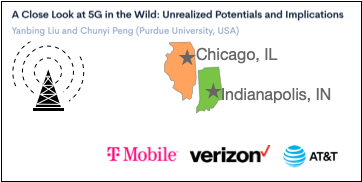
MI-LAB Used for a 5G measurement study in the US!
December 10, 2022
MI-LAB has been used to conduct a 5G measurement study in two US cities: Chicago and Indianapolis with all three top-tier operators: AT&T, Verizon and T-Mobile. Using data traces collected in this 10-month measuresurement study, Yanbing Liu, a PhD student advised by Prof Peng have investigated unrealized potentials in 5G networks. The team has not only quantitively characterized 5G coverage, availability and performance (over both mmWave and Sub-6GHz bands), but also revealed several performance issues. The team finds that real 5G experience is not that satisfactory as anticipated. It is mainly because faster 5G is not used as it can and should. 5G potentials are underutilized in practice, similar to our previous findings in 4G networks (MobiCom'20).
In this work, the team has several surprising findings:
Despite huge speed potentials (say, up to several hundreds of
Mbps), more than half are not realized in practice; Such underutilization
is mainly stemmed from current practice and policies
that manage radio resource in a performance-oblivious manner;
5G is even less used where 5G is co-deployed over both mmWave
and Sub-6GHz bands; Transiently missing 5G is not uncommon
and its negative impacts last much longer. Inspired by these findings, the team designs a patch solution called 5GBoost to fix the problems identified in legacy 5G operations. The preliminary
evaluation over collected traces has validated its effectiveness to realize more 5G potentials.
The paper will appear at IEEE INFOCOM'23, May 17 - 19, New York, USA.
Datasets and codes are released at Github.
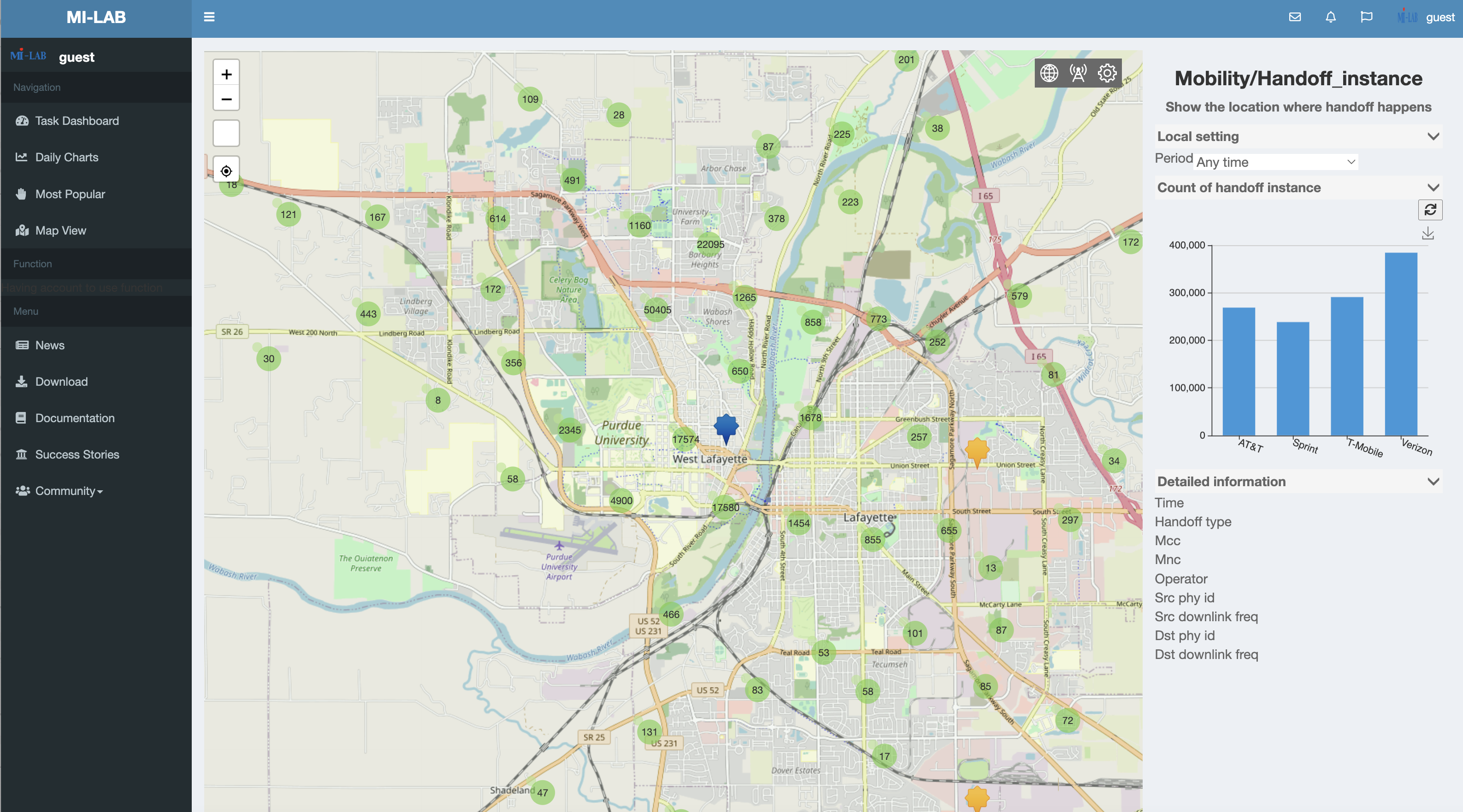
Map has a NEW Look!
November 28, 2021
Map gets a fresh view by upgrading the visualization on dataset statistics and metrics of common interests.
All these amazing upgrades have been made by Jiacen (Jessie) Liu, a undergrad student triple major in Mathematics (Applied Data Science), Statitics and Industrial Management. Thanks for your great work and contribution to MI-LAB, Jiacen (Jessie)!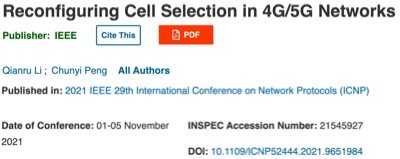
Reconfiguration at ICNP'21: Another Success Story Over MI-LAB
August 5, 2021
Following our MobiCom'20 paper, we have leveraged data traces collected via MI-LAB to conduct a what-if study to boost 5G data speed by reconfiguring tunable parameters. Specfically, we further explore proactive reconfiguration to prevent such unnecessary performance losses. We examine technical challenges, factors and even limitations to reconfigure cell selection in a standard-compatible manner, and finally devise a simple reconfiguration algorithm based on profiling and heuristic searching to efficiently pursue promising performance gains. The evaluation over AT&T and T-Mobile in two US cities: Los Angeles, CA and West Lafayette, IN.
The paper will appear at IEEE ICNP'21, Nov 1 -5, 2021 (Virtual).
Datasets and codes are released at Github.
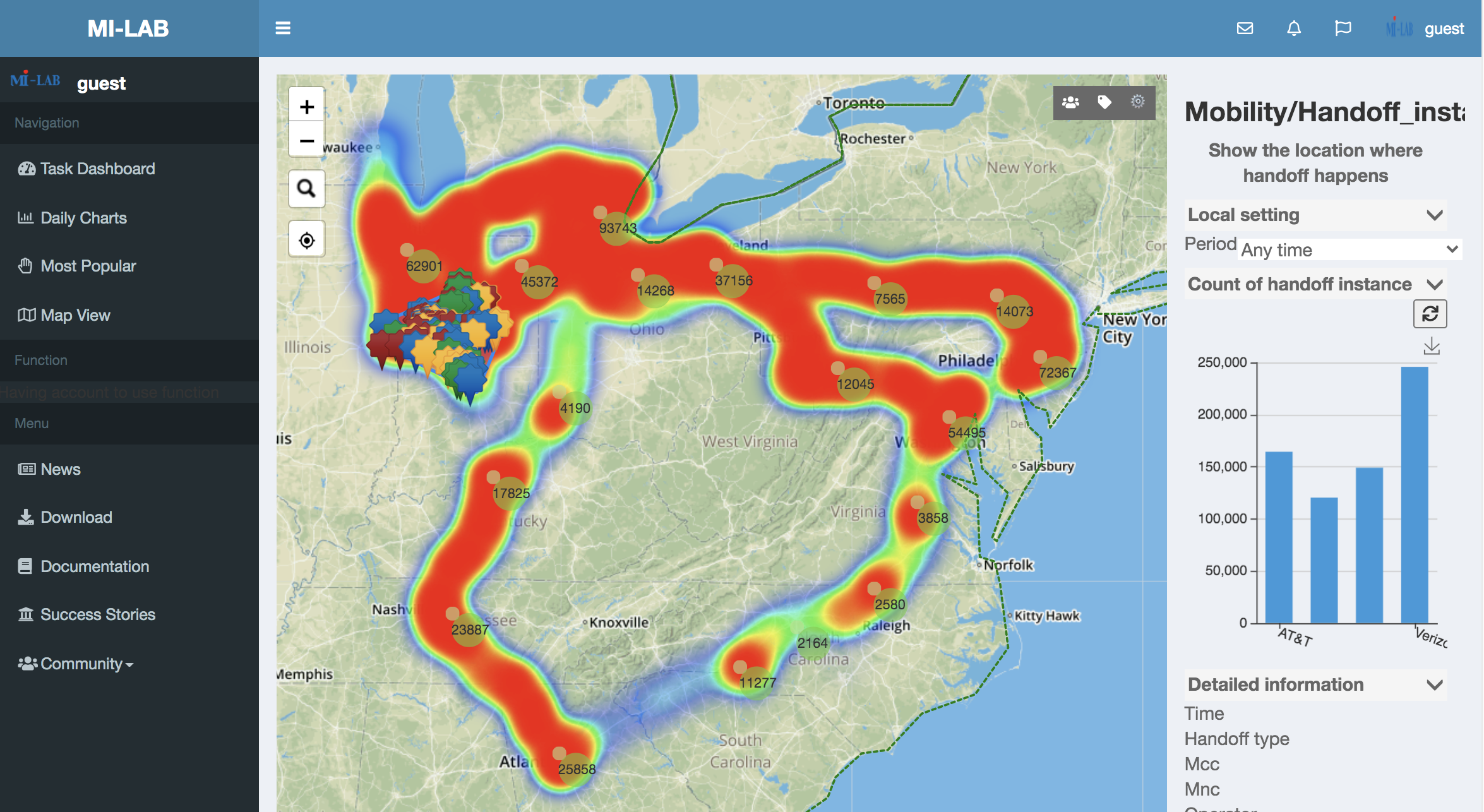
MI-LAB 5.0 released!
November 21, 2020
MI-LAB 5.0 is released! In this version, we release the following new features.
- (1) Map view: Data collected by the MI-LAB team has been visualized over the map. Data includes cell, handover, and RTT delay (mainly ping google) measurements. Even as a guest, you can still see our results in a 3-year measurement over 430,000 km and 5,500 hours, collected over 36 global carriers in 18 countries and regions.
- (2) Data portal: You are allowed to do generic data query and visualization to data collected by MI-LAB. Note you need to be a registered user and get permission of data owners (task publishers).
- (3) Testbed : Advanced testbed control and management features are added to support efficient and scalable experimentation. It is being used for the COVID-19 assessment in the US.
- (4) Python3: The whole code base upgrades from Python2 to Python3 now.
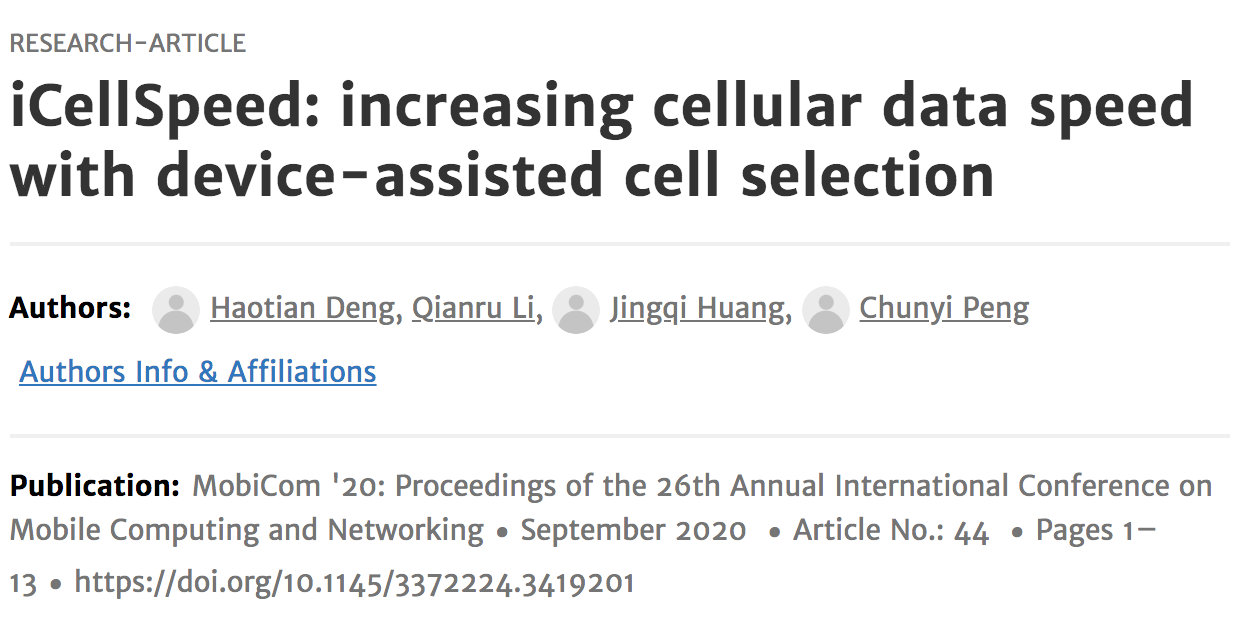
iCellSpeed at MobiCom’20 Increases 4.5G Data Speed without Any Network Changes!
September 23, 2020
Three graduate students from Purdue and UCLA led by Prof Peng have conducted one more success story over MI-LAB. In this project, they have proposed iCellSpeed, an on-device solution to increase data access speed without any network change to substantiate unrealized data speed potentials. They have designed iCellSpeed to facilitate network-controlled cell selection with proactive device-side assistance towards more desirable cells that are able to offer higher data speed than the default ones. They have validated its effectiveness in AT&T and Verizon networks. iCellSpeed has increased data access speed by more than 10 Mbps at 79% of test locations (> 25Mbps at 29% of locations, up to 80.6 Mbps). It doubles access speed at 62.5% of locations with the gain up to 28.4x.
More information is available at their MobiCom'20 [paper],[datasets], [20-min presentation] .
Here is a 5-minute pitch at Youtube for more information.
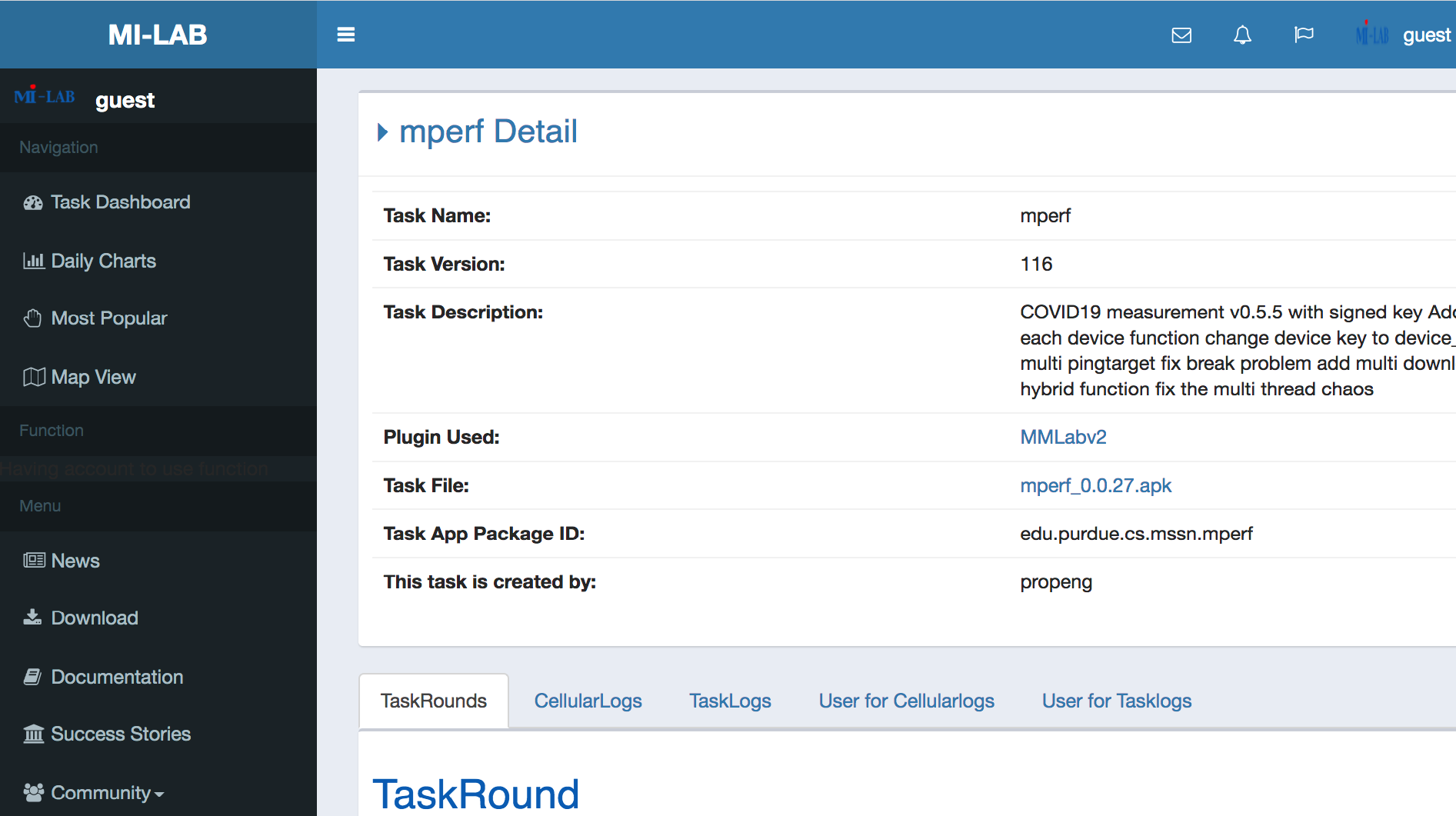
MI-LAB Adopted to Assess COVID-19 Impacts on US Carrier Networks
May 1, 2020
MI-LAB will be used to conduct a new project recently funded by NSF CNS-2027650 to assess the impact on operational mobile networks (namely, AT&T, Verizon and T-Mobile) in face of COVID-19 pandemic. This measurement study will leverage MI-LAB to take a novel on-device measurement approach. We aim to measure and diagnose performance and reliability of the national 4G/4.5G mobile networks. In the short-term, our objective is to meet the immediate need of assessing operational mobile networks, unveiling technical issues, understanding their pressing challenges, and proposing remedies without major infrastructure upgrade during this public health crisis. In the long term, datasets collected by this project will be released to the public, empowering data-driven software solutions to efficiently utilize enhanced network capabilities and accelerate 5G innovations in mobile network research community.
Call For Participators: If you are interested in participating this measurement study, please download mperf task and run it. Please contact us if you have any question or interest.
One More Success Story Over MI-LAB
March 3, 2020
Three graduate students led by Prof Peng have conducted one more study over MI-LAB. This study has unveiled an important, yet unexplored problem in operational mobile networks: missed performance potentials exist in the operational mobile networks but have not been realized. The devices fail to achieve faster broadband experience despite its feasibility over the same network infrastructure. More information regarding this study can be found here. Datasets have been released at the <MI-LAB data repo and preliminary results have appeared at ACM Hotmobile’20, Unveiling the Missed 4.5G Performance in the Wild.
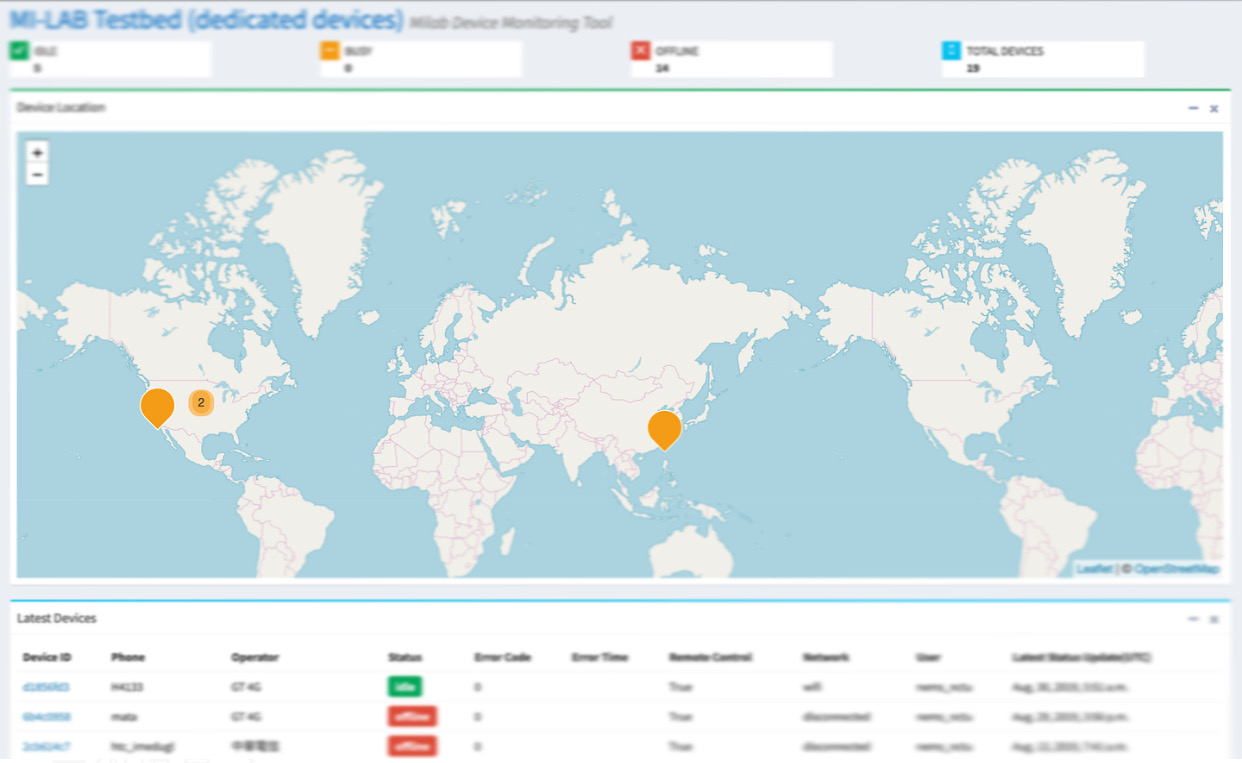
MI-LAB Testbed Management is available
August 26, 2019
Admins can control users' mobile phones, manage the tasks remotely through the MI-LAB website. They can observe the location, the current status, the latest updates of users' phone, all the data uploaded from users' phone and more updated features which makes MI-LAB admins easier and faster to manage.
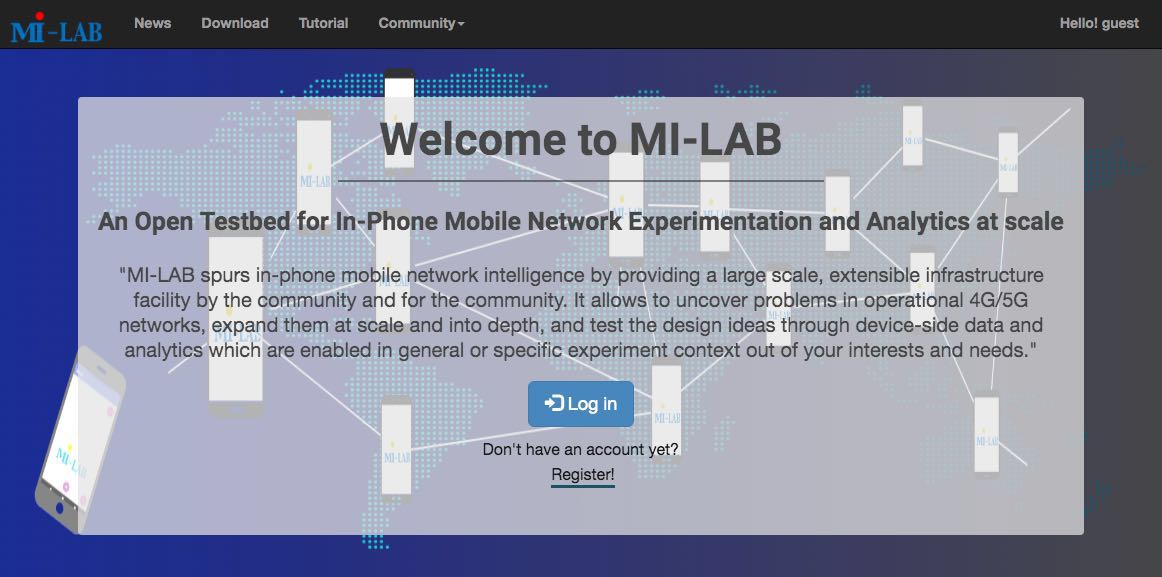
MI-LAB has a NEW Look!
June 6, 2019
MI-LAB gets a fresh view, along with new upgrades on experimentation support, statistics, visualization.
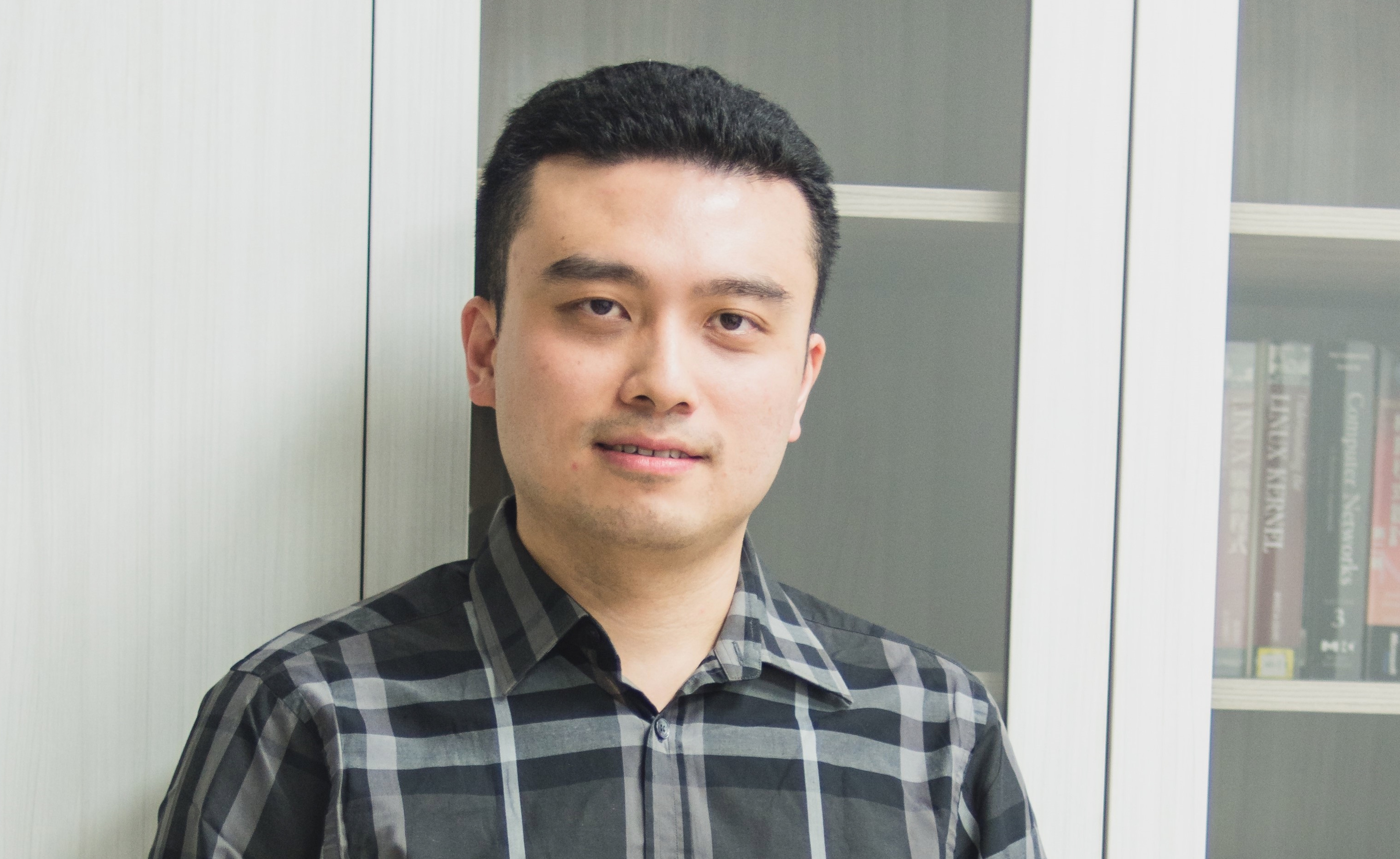
NCTU team joins MI-LAB!
May 15, 2019
Prof Li , along with his students, joins the MI-LAB development and deployment!
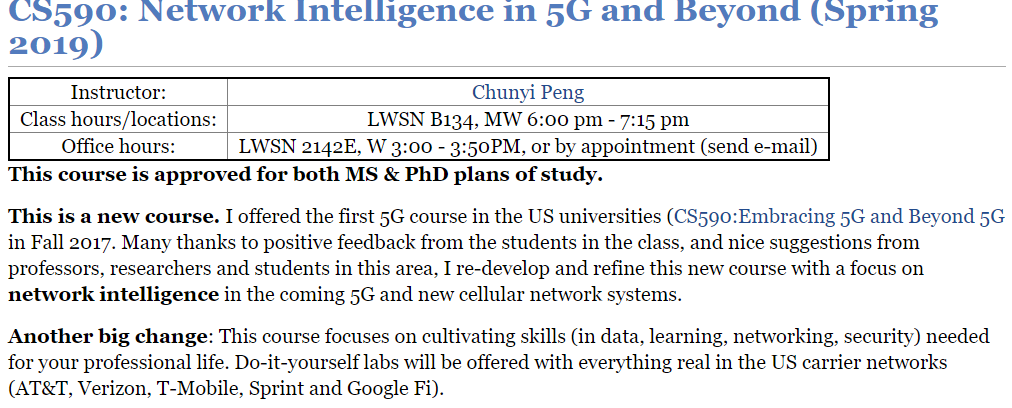
MI-LAB First Used For A New Course
January 8, 2019
MI-LAB will be used for a new course CS590:Network Intelligence in 5G and Beyond (Spring 2019) and brings first-hand real-world experiences to the classroom.
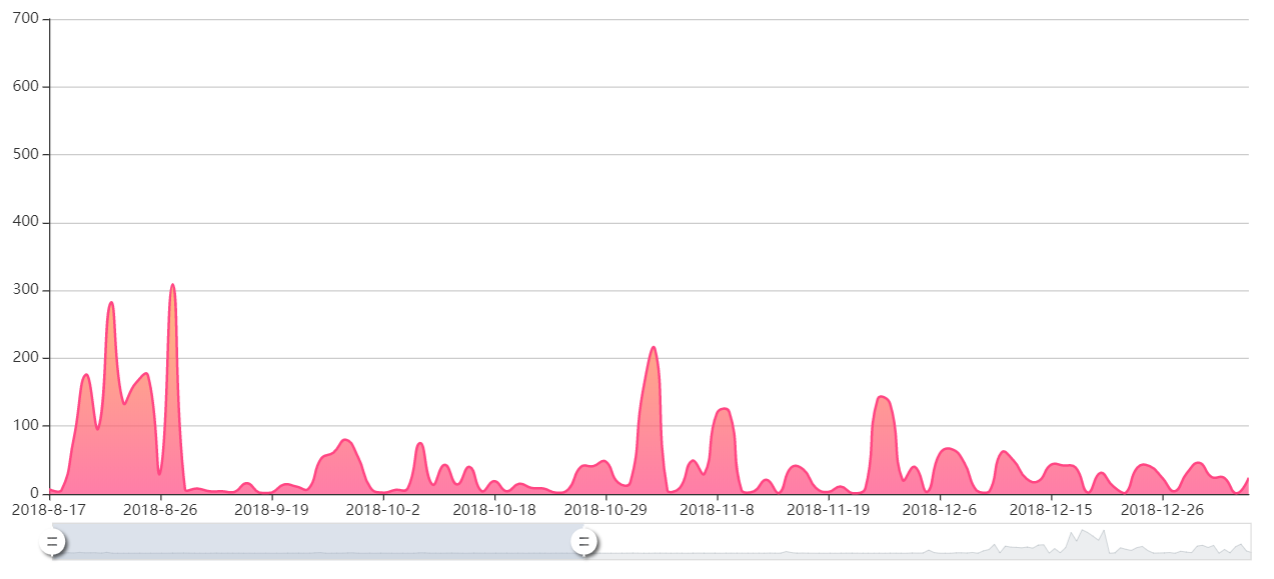
Statistical Result are available
October 15, 2018
MI-LAB now provides statistical results of its operations and data logs.

MI-LAB Tutorial Is Online
October 01, 2018
User can follow the tutorial to explore MI-LAB step by step.
MI-LAB Kicks Off!
August 14, 2018
MI-LAB (public release) kicks off now! Welcome to use MI-LAB to conduct your experiments and measurements or reuse data and analytics we have developed in our research tasks. Please try and have fun. Your feedback are appreciated.